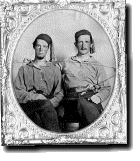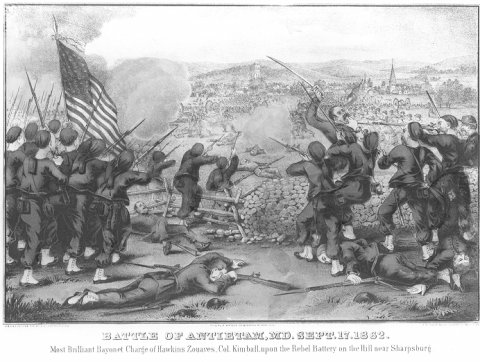 Open main menu
Open main menu
 Open main menu
Open main menu

In September 1862, David L. Thompson was a Private in Company G, 9th Regiment ("Hawkins' Zouaves") New York Volunteers. His Regiment, led by LCol. Edgar A. Kimball, was part of MGen. Burnside's Ninth Corps on the far left of the Union line along Antietam Creek. The regiment had quietly marched into position on the heights overlooking the east bank of the stream late on the night of 16 September.
Although up early on the 17th, they did not move to the attack until after the bridge over the creek (later called the Burnside Bridge) had been carried by the 51st NY and 51st PA Regiments at about 1 PM. They were then part of Burnside's drive toward the town of Sharpsburg between about 3 and 4:30 PM.
The following account was written by Pvt Thompson about 20 years after the war for Century Magazine, and was later reprinted in Battles and Leaders (see Sources). Although the experience of a common soldier in battle may not be much for "grand strategy", it does give you an inside view that no General's report can match. I particularly like his concluding paragraph about the realities of human instinct under fire.
...so the morning wore away and the fighting on the right [in the Cornfield and West Woods] ceased entirely. That was fresh anxiety - the scales were turning perhaps, but which way? About noon the battle began afresh. This must have been Franklin's men of the Sixth Corps, for the firing was nearer, and they came up behind the center [in the Sunken Road]. Suddenly a stir beginning far upon the right, and running like a wave along the line, brought the regiment to its feet. A silence fell on every one at once, for each felt that the momentous 'now' had come. Just as we started I saw, with a little shock, a line-officer take out his watch to note the hour, as though the affair beyond the creek were a business appointment which he was going to keep.
When we reached the brow of the hill the fringe of trees along the creek screened the fighting entire, and we were deployed as skirmishers under their cover. We sat there two hours. All that time the rest of corps had been moving over the stone bridge and going into position on the other side of the creek. Then were ordered over a ford which had been found below the bridge, where the water was waist deep. One man was shot in mid-stream.
At the foot of the slope on the opposite side the line was formed and we moved up through the thin woods. Reaching the level we lay down behind a battery which seemed to have been disabled. There, if anywhere, I should have remembered that I was soaking wet from my waist down. So great was the excitement, however, that I have never been able to recall it. Here some of the men, going to the rear for water, discovered in the ashes of some hay-ricks which had been fired by our shells the charred remains of several Confederates. After long waiting it became noised along the line that we were to take a [Confederate] battery that was at work several hundred yards ahead on the top of a hill. This narrowed the field and brought us to consider the work before us more attentively.
Right across our front, two hundred feet or so away, ran a country road bordered on each side by a snake fence. Beyond this road stretched a plowed field several hundred feet in length, sloping up to the battery which was hidden in a corn field. A stone fence, breast-high, inclosed the field on the left, and behind it lay a regiment of Confederates, who would be directly on our flank if we should attempt the slope. The prospect was far from encouraging, but the order came to get ready for the attempt. Our knapsacks were left on the ground behind us.

At the word a rush was made for the fences. The line was so disordered by the time the second fence was passed that we hurried forward to a shallow undulation a few feet ahead, and lay down among the furrows to re-form, doing so by crawling up into line. A hundred feet or so ahead was a similar undulation to which we ran for a second shelter. The battery, which at first had not seemed to notice us, now, apprised of its danger, opened fire upon us. We were getting ready now for the charge proper, but were still lying on our faces. Lieutenant-Colonel Kimball was ramping up and down the line. The discreet regiment behind the fence was silent. Now and then a bullet from them cut the air over our head, but generally they were reserving their fire for that better show which they knew they would get in a few minutes. The battery, however, whose shots at first went over our heads, had depressed its guns so as to shave the surface of the ground. Its fire was beginning to tell.
I remember looking behind and seeing an officer riding diagonally across the field - - a most inviting target - - instinctively bending his head down over his horse's neck, as though he were riding through driving rain. While my eye was on him I saw, between me and him a rolled overcoat with its straps on bound into the air and fall among the furrows. One of the enemy's grape-shot had plowed a groove in the skull of a young fellow and had cut his overcoat from his shoulders. He never stirred from his position, but lay there face downward, a dreadful spectacle. A moment after, I heard a man cursing a comrade for lying on him heavily. He was cursing a dying man.
As the range grew better, the firing became more rapid, the situation desperate and exasperating to the last degree. Human nature was on the rack, and there burst forth from it the most vehement, terrible swearing I have ever heard. Certainly the joy of conflict was not ours that day.
The suspense was only for a moment, however, for the order to charge came just after. Whether the regiment was thrown into disorder or not, I never knew. I only remember that as we rose, and started all the [Confederate] fire that had been held back so long was loosed. In a second the air was full of the hiss of bullets and the hurtle of grape-shot. The mental strain was so great that I saw at that moment the singular effect mentioned, I think, in the life of Goethe on a similar occasion - - the whole landscape for an instant turned slightly red. I see again, as I saw it then in a flash, a man just in front of me drop his musket and throw up his hands, stung into vigorous swearing by a bullet behind the ear. Many men fell going up the hill, but it seemed to be all over in a moment, and I found myself passing a hollow where a dozen wounded men lay - - among them our sergeant-major who was calling me to come down. He had caught sight of the blanket rolled across my back, and called me to unroll it and help to carry from the field one of our wounded lieutenants.
When I returned from obeying this summons, the Regiment was not to be seen. It had gone in on the run, what there was left of it, and had disappeared in the cornfield about the battery. There was nothing to do but lie there and await developments... we lay there til dusk - perhaps an hour, when the fighting ceased. During that hour, while the bullets snipped the leaves from a young locust tree growing at the edge of the hollow and powdered us with the fragments, we had time to speculate on many things - among others on the impatience with which men clamor, in dull times, to be led into a fight.
We heard all through the war that the army was "eager to be led against the enemy." It must have been so, for truthfull correspondents said so, and editors confirmed it. But when you came to hunt for this particular itch, it was always the next regiment that had it. The truth is, when bullets are whacking against tree trunks and solid shot are cracking skulls like egg shells, the consuming passion in the breast of the average man is to get out of the way. Between the physical fear of going forward, and the moral fear of going back, there is a predicament of exceptional awkwardness from which a hidden hole in the ground would be a wonderfully welcome outlet.
Of the 600 men of the 9th NY who crossed the Antietam that afternoon, Thompson reports that 45 were killed outright, and another 176 were wounded. Thompson himself and a number of others of his Regiment were captured that evening by members of the 15th Georgia Regiment, who held that part of the field at battle's end. He eventually reached Richmond's Libby Prison, where he spent just nine days before being paroled to Annapolis and then home. He was officially exchanged about three weeks later, which meant that, as he says it, "I was once again, legally and technically, food for powder."
You might also like to visit a nice site about the 9th New York "Hawkins Zouaves" for more about the regiment and its history.